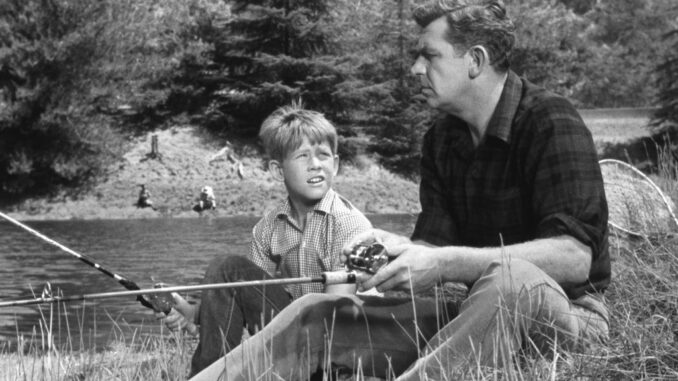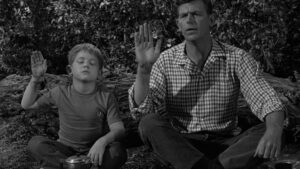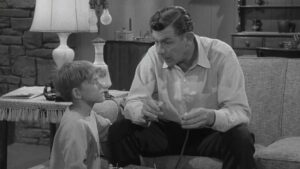
When you think of ‘The Andy Griffith Show,’ images of small-town charm and heartfelt humor likely spring to mind. However, lurking beneath the surface of this beloved sitcom is a rich tapestry of lessons and experiences, especially for its young star, Ron Howard. Interestingly, Howard discovered an odd yet effective way to learn writing during his time on the show. So, what exactly was this unusual approach, and how did it shape his career? Let’s dive in!
The Roots of Ron Howard’s Writing Journey
A Young Star in Mayberry

Ron Howard was just a kid when he stepped into the role of Opie Taylor, the son of Sheriff Andy Taylor. Although the show primarily focused on the dynamics of family and community, Howard found himself in an environment that fostered creativity and storytelling.
The Importance of Scripted Television
Television scripts were a world of their own, providing structure while allowing for creative expression. Howard recognized early on how pivotal these scripts were in shaping the narrative and dialogue of the series.
The Odd Way Ron Howard Learned to Write
The Art of Observation
Howard learned that observing the world around him was crucial for storytelling. He spent countless hours on set, soaking in the nuances of character interactions, timing, and comedic delivery. This method of learning through observation became one of his strongest tools in writing.
Scripts as Learning Tools
During his tenure on ‘The Andy Griffith Show,’ Howard didn’t just memorize lines; he dissected scripts. He studied the structure, pacing, and character development, allowing him to understand what made a good story.
Analyzing Character Arcs
By focusing on character arcs and their interactions, Howard was able to appreciate how writers crafted complex personalities that resonated with audiences. This deep dive into character development not only influenced his acting but also laid the groundwork for his writing.
The Creative Environment of Mayberry
A Supportive Cast and Crew

The collaborative spirit of the show allowed Howard to learn from industry veterans. The guidance and feedback from seasoned writers, directors, and fellow actors created a nurturing environment for a budding writer.
Humor as a Learning Tool
Humor was a staple of ‘The Andy Griffith Show,’ and Howard soon realized how critical comedic timing and wit were in crafting engaging narratives. He began to experiment with humor in his writing, understanding its power to connect with audiences.
Finding His Voice
Through the blend of observation, script analysis, and humor, Howard began to find his unique voice as a writer. The blend of sincerity and wit he honed on set became integral to his future works.
Ron Howard’s Transition to Writing and Directing
A Journey Beyond Opie
After ‘The Andy Griffith Show’ ended, Howard transitioned to writing and directing. His experiences on the show shaped his approach, emphasizing character-driven storytelling and humor.
Crafting His Own Stories
Howard leveraged the lessons learned from Mayberry to create compelling narratives in his directorial projects, such as ‘A Beautiful Mind’ and ‘Apollo 13.’ The blend of authenticity and creativity became hallmarks of his filmmaking style.
The Legacy of Writing Lessons from Mayberry
Inspiring Future Generations
Howard’s journey serves as an inspiration for aspiring writers and filmmakers. His story illustrates how experiences, even those that seem unrelated, can shape one’s creative path.
Writing for Film and Television
As he ventured into writing for film and television, the foundations laid during his childhood on ‘The Andy Griffith Show’ provided him with the skills to navigate the entertainment industry successfully.
The Impact of ‘The Andy Griffith Show’ on Howard’s Career
A Foundation for Success
Howard’s experiences on the show didn’t just teach him how to act; they instilled a love for storytelling that propelled his career forward. The relationships he built and the lessons he learned became integral to his development as a writer and director.
Understanding Audience Engagement
One of the most significant takeaways for Howard was understanding what resonates with audiences. His time in Mayberry gave him a firsthand look at how to craft narratives that evoke emotion and laughter.
Navigating Industry Changes
The television landscape has changed dramatically since the 1960s, but the fundamental principles of storytelling remain the same. Howard’s experiences have equipped him to adapt and thrive in various formats.
Conclusion: Ron Howard’s Unusual Path to Writing Mastery
Ron Howard’s journey from child actor to accomplished writer and director is a testament to the power of observation, mentorship, and creativity. His experiences on ‘The Andy Griffith Show’ provided him with a unique toolkit for storytelling, highlighting that sometimes, the most effective lessons come from unexpected places. As he continues to inspire audiences with his work, Howard’s story serves as a reminder that every experience shapes who we are and what we create.